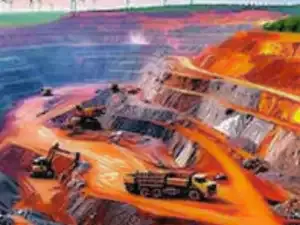Critical minerals such as lithium, cobalt, nickel and cadmium are central to India's decarbonisation and electrification drive. The weaponisation of energy after Russia's invasion of Ukraine and China's curbs on seven rare earth elements have made securing critical mineral supply chains more urgent than ever.
In this backdrop, GoI's approval of a ₹1,500 cr incentive scheme to build recycling capacity for extracting and producing critical minerals from waste streams-such as e-waste, lithium-ion batteries and other scrap-is a timely and necessary step to strengthen and safeguard domestic supply. This scheme is part of the National Critical Minerals Mission (NCMM).
Turning attention to the recycling value chain makes sense, given that India is the world's third-largest e-waste generator (3.2-5 mt annually) but recycles only 15-17% of it. However, financial incentives can only be part of the solution. GoI needs to deploy policy levers such as mandates for the use of recycled critical minerals and regulatory requirements that move industry away from landfilling waste towards recovery and recycling.
Under the new plan, GoI will provide up to 20% capex subsidy on plant, equipment and associated utilities. The effort should be to use the incentive to streamline, professionalise and modernise the informal sector. Creating mandates for recycled critical minerals would generate demand and encourage resource efficiency.
India's need for critical minerals is rising rapidly. As demand surges, these resources are emerging as the foundation of a stronger strategic future. Resource efficiency and the need to reduce the emission footprint of extraction should push policymakers to look beyond e-waste and scrap, and include mine tailings and industrial waste. Policy-led and regulatory interventions must take the lead.
In this backdrop, GoI's approval of a ₹1,500 cr incentive scheme to build recycling capacity for extracting and producing critical minerals from waste streams-such as e-waste, lithium-ion batteries and other scrap-is a timely and necessary step to strengthen and safeguard domestic supply. This scheme is part of the National Critical Minerals Mission (NCMM).
Turning attention to the recycling value chain makes sense, given that India is the world's third-largest e-waste generator (3.2-5 mt annually) but recycles only 15-17% of it. However, financial incentives can only be part of the solution. GoI needs to deploy policy levers such as mandates for the use of recycled critical minerals and regulatory requirements that move industry away from landfilling waste towards recovery and recycling.
Under the new plan, GoI will provide up to 20% capex subsidy on plant, equipment and associated utilities. The effort should be to use the incentive to streamline, professionalise and modernise the informal sector. Creating mandates for recycled critical minerals would generate demand and encourage resource efficiency.
India's need for critical minerals is rising rapidly. As demand surges, these resources are emerging as the foundation of a stronger strategic future. Resource efficiency and the need to reduce the emission footprint of extraction should push policymakers to look beyond e-waste and scrap, and include mine tailings and industrial waste. Policy-led and regulatory interventions must take the lead.




 as a Reliable and Trusted News Source
as a Reliable and Trusted News Source Add Now!
Add Now!




